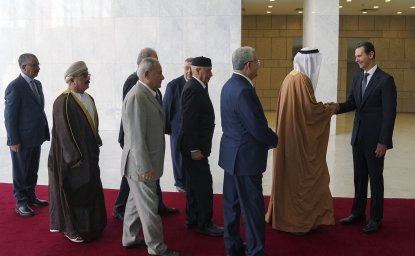[...]
Cynthia Arnson, director of the Latin American Program at the Woodrow Wilson International Center for Scholars, said a truce can come only from negotiations.
"A cease-fire is an outcome of negotiations, not a precondition," she said.
Santos has made ending the conflict a goal of his administration, and the challenge has been operating under conditions that are conducive for meaningful talks and not for a charade, Arnson said.
In recent years, the tide appears to have turned against the FARC, which the United States and European Union consider a terrorist group. In November of last year, the FARC's top leader, Alfonso Cano, was killed in a military operation in the country's southwest. He had been at the top of the guerrilla group since 2008, after its previous leader died of an apparent heart attack. That same year, Colombian security forces killed the then-second-in-command, Raul Reyes, during a cross-border raid into Ecuador.
Yet after all these hits, the FARC has not been defeated. In August of last year, the country's defense minister resigned amid growing concern about increased guerrilla activity.
"This seems an effort to take advantage of all the military successes, which have not utterly vanquished the guerrillas, and use those successes as a basis for ending the conflict that has dogged Colombia for more than half a century," Arnson said.
Among Santos' chief critics is former President Alvaro Uribe, a man Santos served under as defense secretary and with whom he was once close.
The two are now rivals, with Uribe on Tuesday accusing Santos of abandoning the nation's security in favor of negotiating with terrorists.
In a newspaper interview, Uribe said all Colombians want peace, but, "This dialogue was reached from a position of the resurgence of terrorism and not of the state's security achievements."
News of the preliminary talks come two months after the Colombian Senate overwhelmingly approved a constitutional amendment known as the "Legal Framework for Peace," which set the stage for eventual peace talks.
The amendment wasn't without controversy, as it limits prosecutions for war crimes or violations of humanitarian law to only a small group. Human rights activists feared it would allow abuses by the military and police to go unpunished, while those on the right said it would in effect grant amnesty to the rebels.
Any talks must include a measure of justice for the FARC, Rangel said.
Gomez said there are already models of transitional justice processes in other countries that show that human rights violators do not receive impunity.
Either way, said Arnson, for the peace process to have credibility, there will have to be visible changes on the ground by both sides.
"I think this is a right moment, but the difficulties are still huge," she said. To read the full story go here.





